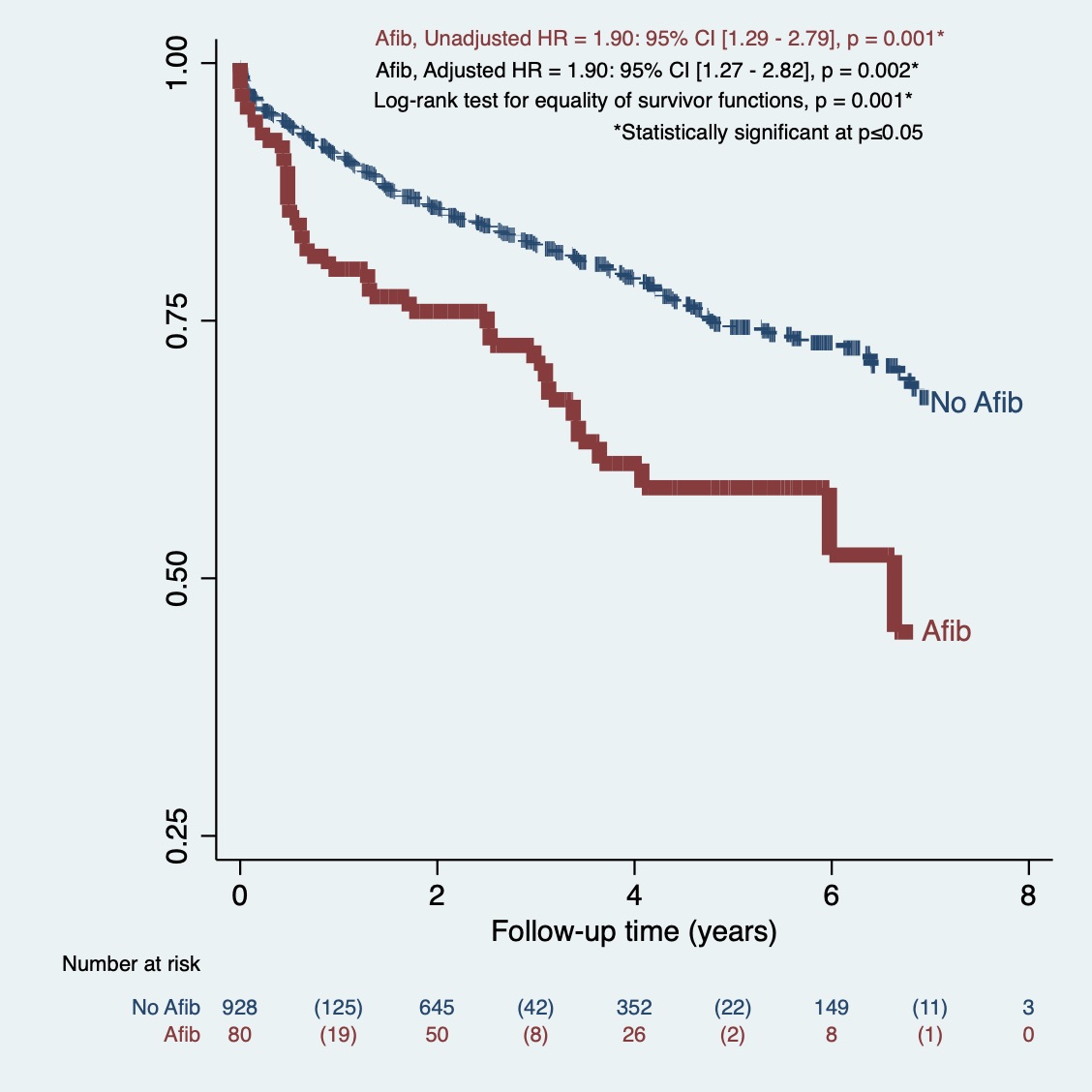Atrial Fibrillation Predicts Inferior Survival in Liver Transplant Recipients of Advanced Age in a Large Multicenter U.S. Cohort
1U of Wisconsin, Madison, WI, 2Stanford, Palo Alto, CA, 3U of Massachusetts, Worcester, MA, 4U of California, San Francisco, CA, 5Northwestern, Chicago, IL, 6U of Pennsylvania, Philadelphia, PA, 7Columbia, New York, NY, 8Florida Hospital, Orlando, FL, 9U of Arizona, Phoenix, AZ, 10Duke, Durham, NC, 11U of Chicago, Chicago, IL, 12Henry Ford Hospital, Detroit, MI, 13Scripps, San Diego, CA
Meeting: 2020 American Transplant Congress
Abstract number: C-163
Keywords: Elderly patients, Graft survival, Liver transplantation, Multicenter studies
Session Information
Session Name: Poster Session C: Liver: Recipient Selection
Session Type: Poster Session
Date: Saturday, May 30, 2020
Session Time: 3:15pm-4:00pm
 Presentation Time: 3:30pm-4:00pm
Presentation Time: 3:30pm-4:00pm
Location: Virtual
*Purpose: More liver transplants (LT) are being performed in patients >65 years (y) – a population with higher rates of cardiovascular (CV) disease. It is not known if current CV risk models adequately stratify mortality risk in this population. We aimed to identify which CV risk factors best predicted mortality in LT recipients (LTRs) > 65.
*Methods: All primary LTRs > 65y from 2010-16 at 13 centers were included in the Re-Evaluating Age Limits in Liver Transplantation (REALT) consortium. CV risk factors within 1y pre-LT, including: atrial fibrillation (AF), current tobacco use, myocardial infarction, congestive heart failure, peripheral vascular disease, diabetes, moderate to severe (mod-sev) renal disease, hypertension, hyperlipidemia and coronary artery bypass grafting, were assessed using cox-proportional regression model.
*Results: Of 1031 LTRs, median age was 68, 64% male, 70% Caucasian; median MELDNa at LT was 19 (IQR 13 – 27) and median allocation MELD was 25 (IQR 17-25). Within 1y pre-LT, CV comorbidities included AF (8%), current tobacco use (2%), and mod-sev renal disease (32%). AF (HR=1.89, 95%CI [1.27-2.82], p=0.002) and mod-sev renal disease (HR=1.49, 95%CI [1.14-1.95], p=0.004) were associated with increased risk of death in the crude and adjusted estimates. In univariate regression analysis, current tobacco use was not predictive of post-LT mortality (HR=1.84, 95%CI [0.97-3.50], p=0.06); however, when adjusted for other risk factors, it was associated with worse patient (HR=2.19, 95% CI (1.14-4.18), p=0.02) and graft survival (HR=2.04, 95% CI [1.07-3.89], p=0.03).
*Conclusions: Our study shows that pre-LT AF is associated with increased mortality in LTRs ≥ 65y, even after accounting for other CV risk factors. AF was previously shown to be associated with decreased LT survival and is likely an indicator of CV disease and cirrhotic cardiomyopathy. Current, but not previous, tobacco use and mod-sev renal disease were predictive of worse patient and graft survival.
To cite this abstract in AMA style:
German M, Hristov A, Lee A, Osman F, Kwong A, Devuni D, Wang C, Boike J, Jo J, VanWagner L, Serper M, Sharma R, Verna E, Shor J, Koteish A, Sehmbey G, Seetharam A, John N, Patel Y, Kappus M, Couri T, Paul S, Salgia R, Nhu Q, Frenette C, Lai J, Goel A, Spengler E. Atrial Fibrillation Predicts Inferior Survival in Liver Transplant Recipients of Advanced Age in a Large Multicenter U.S. Cohort [abstract]. Am J Transplant. 2020; 20 (suppl 3). https://atcmeetingabstracts.com/abstract/atrial-fibrillation-predicts-inferior-survival-in-liver-transplant-recipients-of-advanced-age-in-a-large-multicenter-u-s-cohort/. Accessed February 27, 2026.« Back to 2020 American Transplant Congress

